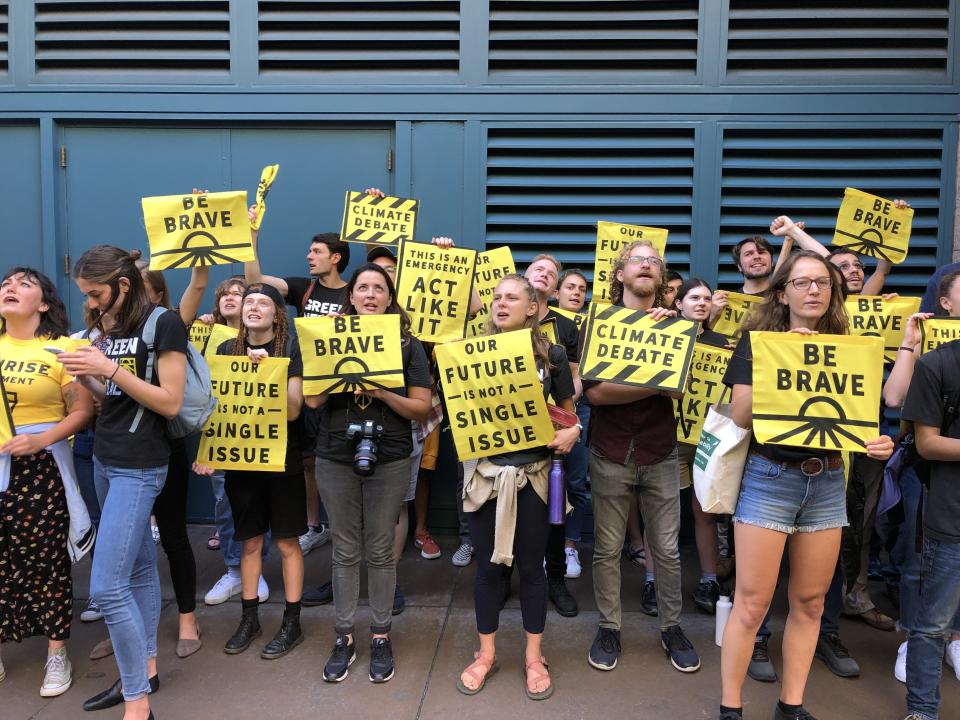Climate Debate’s Uncertainty Hangs Heavy Over Democratic Party Meeting
SAN FRANCISCO ― Mounting friction over the need for a single-issue debate on climate change was the elephant in the room Friday as the Democratic National Committee convened for the second day of its annual summer meeting.
Friday’s event in downtown San Francisco, which was largely dedicated to short speeches from 13 of the candidates, came a day after the DNC’s resolutions committee voted 17-8 against such a debate.
Activists fed up with the party’s opposition to a debate on climate ― which got only 12 minutes of airtime during last month’s Democratic debates ― flooded the room in outrage Thursday. Tensions from that standoff lingered Friday as delegates assembled to hear directly from the 2020 candidates.
“I’m a little disappointed at the lack of climate change debate happening, personally,” New Mexico delegate Marcus Porter, 33, said after the first round of candidate statements.
“But we’re trying to stay positive,” he added, noting that a petition is circulating to bring the proposal to the floor during the full committee’s general session on Saturday.
But even Tina Podlodowski, the DNC member planning to present the resolution again Saturday has admitted that it’s a long shot, according to Vice News. Party leaders haven’t indicated much willingness to budge on the issue despite nearly every presidential contender supporting such a debate.

Protesters with the influential youth-led climate group Sunrise Movement, which had about 100 activists storming Thursday’s vote, also kept the issue alive Friday. Sofie Karasek, a spokesperson for the group, estimated they had about 250 demonstrators show up Friday, chanting outside the Hilton Hotel and holding signs that read, “This is an emergency. Act like it.”
Karasek was focused on another development: the committee’s vote to advance a resolution reversing a ban on 2020 candidates participating alongside one another at climate forums not sanctioned by the DNC.
“Yesterday, we were able to have a big victory with the DNC reversing their policy of sanctioning candidates that participate on third-party debate stages at the same time,” Karasek said.
“I think that it’s amazing we’ve gotten to this point,” she said. “It just shows the power of young people and grassroots organizing that we’ve been able to make this happen.”
Many of the front-runner candidates were silent on climate change in their remarks Friday, underscoring activists’ concerns that the issue isn’t getting enough attention.
Sens. Cory Booker (D-N.J.), Kamala Harris (D-Calif.) and Elizabeth Warren (D-Mass.) didn’t bring climate change up at all during their 10-minute speeches.
Sen. Bernie Sanders (I-Vt.) dedicated the most time to the issue.
“Our time is now to tell the fossil fuel industry that we will no longer allow them to destroy this planet for their short-term profits,” he said.
Former Vice President Joe Biden, who remains the highest-polling candidate, did not attend the event. But in a video played for the audience, he didn’t bring it up.
The lowest-polling candidates spoke most frankly about the debate tensions, with Sen. Michael Bennet (D-Colo.), Rep. Tim Ryan (D-Ohio) and billionaire hedge fund manager Tom Steyer all saying explicitly that they support having a climate-only debate.
But promises of a candidate’s ability to take down President Donald Trump dominated the conversation Friday.
Former Housing and Urban Development Secretary Julián Castro spoke of Trump having “scapegoated immigrants, otherized people of color,” and Sanders said the president emboldened “bigots, xenophobes and white supremacists as domestic terrorists commit acts of violence across our country.”
On Harris’ home turf of the Bay Area, the senator ― who was welcomed by an animated group of volunteers chanting as she walked on stage ― asked “exactly for whom” Trump was trying to “make America great again.”
Meanwhile, Warren, who drew the longest applause of any candidate, focused her remarks not on Trump, racism or climate change, but rather on the economy and the need for “big, structural change” in the form of a wealth tax, higher wages, tuition-free college and more.
But the crowd cheered loudest of all not for any of the candidates but for another speaker: Rev. William Barber. Delivering remarks ahead of the afternoon session, Barber had the crowd on its feet as he spoke in his booming voice about systemic racism and the policies that sustain it.
Climate change and environmental issues, he reminded the crowd, play an integral role in racial justice and inequality.
“Young people are right: Climate change is a moral issue,” Barber said. “You can’t talk about climate change and not talk about systemic racism and poverty.”
“If you’re running for office and you can’t go by Cancer Alley,” he added, referring to a Louisiana town with high rates of cancer due to toxic pollution, “you ain’t got no business on Pennsylvania Avenue.”
Related Coverage
‘Green New Deal’ Gains Momentum, But Few Progressive Caucus Democrats Pledge Support
Jay Inslee, Climate Candidate, Exits 2020 Presidential Race
Democratic National Committee Votes Down Climate Debate. Activists Vow To Fight On.
Love HuffPost? Become a founding member of HuffPost Plus today.
This article originally appeared on HuffPost.

